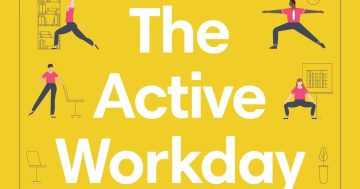Ashira Prossack* offers a few ways to help women reduce workplace stress and decompress after a hard day.
 Workplace stress has reached record high levels over the past year, impacting both individuals and companies alike.
Workplace stress has reached record high levels over the past year, impacting both individuals and companies alike.
While it isn’t possible to eliminate stress completely, there are ways to manage and mitigate it.
Here’s how to reduce stress at work:
Create an end of workday routine.
In the morning there’s a more obvious transition into the workday.
You have a set of activities that you do prior to work like eating breakfast, sending the kids off to school, or reading the newspaper.
Once these activities are done, you know that it’s time to transition into work mode.
At the end of the day, especially when working from home, this transition is far less pronounced.
To fix this, create an end of workday routine.
Close browser tabs, rinse out your coffee mug so it’s fresh for the morning, tidy up your desk, and do anything else that helps you end the workday.
This routine becomes your cue to disconnect and makes switching off from work a bit easier to do.
Fully disconnect from work.
Being able to fully disconnect from work is critical in managing and lowering stress levels.
Set boundaries on your working hours and be firm with sticking to them.
Turn off notifications when you aren’t working so you won’t be tempted to check your phone each time it dings.
Add greenery to your workspace.
Studies show that plants and nature are incredible stress relievers.
It only takes a few minutes of looking at greenery to lower stress and anxiety levels, so bring nature into your workspace by adding a few plants.
Keep them on your desk so that you can focus on them when your stress levels start to creep up at any point in the workday.
Don’t worry if you don’t have a green thumb – fake plants and even pictures of plants have the same stress reducing effects.
Fake plants are also a great alternative if you have pets, as many plants are toxic to cats and dogs.
Get moving.
Try to incorporate small amounts of movement throughout your day.
Any kind of movement, from a slow relaxing walk to a high intensity workout, helps to lower stress levels.
If you’re working from home, take a quick walk around your neighbourhood in the morning before work or beat the afternoon slump by taking a walk after lunch.
If you’re working in an office, take the stairs instead of the elevator or take the longer route to the breakroom.
If there’s a park nearby, walk there on your lunch break to get some exercise and fresh air.
Manage your nutrition.
Food has a significant impact on your stress levels.
What you eat can either reduce stress or increase it.
Staying hydrated is equally important, as even mild dehydration exacerbates feelings of stress.
Create a plan for healthy eating that supports your specific nutritional needs, advises Davinia Taylor, a Sunday Times bestselling author and biohacker.
Eat foods rich in healthy fats, protein, fibre, and nutrients to help fuel your body throughout the day.
Taylor recommends avoiding a low-fat diet, as that can actually increase stress levels.
Instead, opt for healthy fats found in nuts, fish, dairy, and avocados.
Improve your sleep.
Getting a good night’s sleep is one of the best ways to reduce stress.
If you aren’t comfortable overnight, you won’t be able to get good quality sleep even if you manage a solid 8 hours because when it comes to sleep, quality is just as important as quantity.
To improve the quality of your sleep, figure out what’s preventing you from being well rested.
This can be everything from a room that’s too warm to a mattress or pillow that’s no longer supportive.
Once you’ve identified what’s causing your sleep issues, invest in upgrades so that you can rest well each night.
Look for products that are designed for your specific sleep needs, like cooling sheets, a weighted blanket, a white noise machine, or a mattress topper to make your bed softer or more supportive.
As soon as you start to implement these changes, you’ll notice a reduction in your stress levels.
Once they become habits, you’ll reap the benefits every day.
*Ashira Prossack is a Communication Trainer & Coach helping people speak with greater confidence, clarity, and credibility.
This article first appeared at forbes.com.











